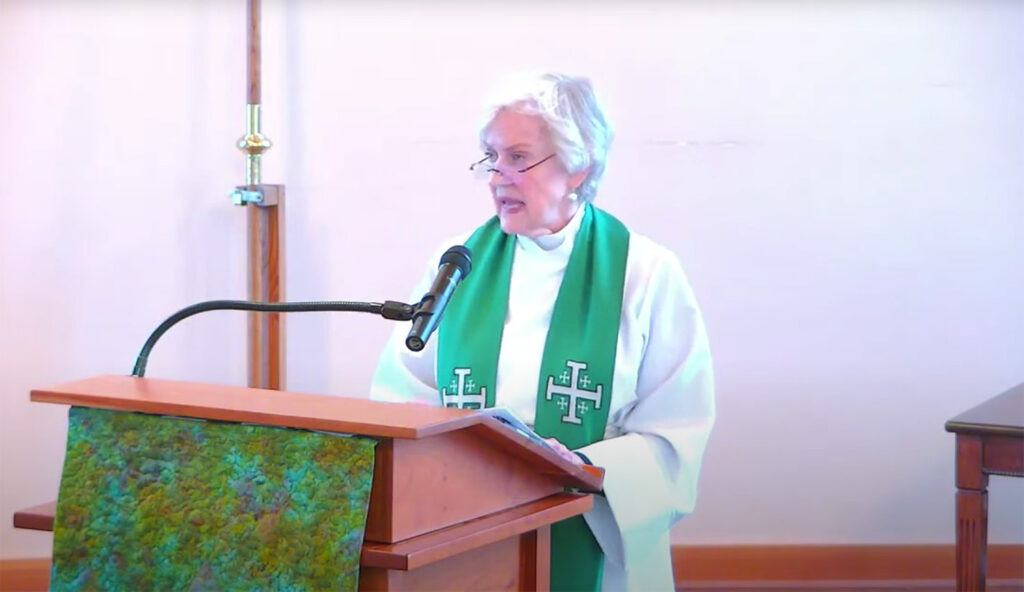July 2, 2023
Trinity Episcopal Church, Bend Oregon
The Rev. Canon Marianne Wells Borg
Genesis 22:1-14
I want to grapple with the familiar story we heard from Genesis. The story about Abraham and his son Isaac. And an angel of the Lord.
For those who have been lifelong church goers you know this story. And that this story garnered Abraham the title “the father of our faith.” Or what 19th century Danish philosopher Soren Kierkegaard called a “Knight of faith.” He also called Mary a Knight of Faith. One who makes a decision based not on reason but takes a “leap of faith” amidst profound uncertainty. Abraham heard a call to sacrifice his only Son. Mary was told she would conceive and bear a son. Both Abraham and Mary made an unfathomable leap of faith and said Here I am. They had no idea what they were saying yes to. But consent they gave.
Kierkegaard wrote about the story of Abraham and Isaac in 1843 in a book he titled: “Fear and Trembling” borrowing from Paul’s letter to the Philippians: “Work out your salvation in fear and trembling.” Kierkegaard’s work greatly influenced Protestant thinking about the Abraham and Isaac story. And continues to.
Let me review the story, our first reading for today.
The story begins: God tested Abraham. God tested Abraham.
Abraham heard God call: Take your only son, your beloved son, to the land of Moriah, Moriah means hill country, and offer him there as a burnt offering.
So Abraham took his son and went off to the hill country, walking for three days.
Three days. We know from other Biblical stories that three days signifies a pivotal, momentous turn. What happens on the third day connotes new life, harmony with new life, completeness. Jonah, for instance, was in the belly of the whale for three days, Jesus was in the tomb for three days.
After three days Abraham took the wood of the burnt offering and laid it on his son Isaac, and he himself carried the fire and the knife. And on the third day, Abraham reached out his hand and took the knife to kill his son. And an angel of the Lord appeared.
The angel said, Abraham do not lay your hand on the boy or do anything to him. For now I know that you fear God, since you have not withheld your son, your only son, from me.
And then Abraham noticed a ram in the thicket. And offered it up instead of his son. And Abraham called that place the Lord shall Provide.
This is a very unsettling story. And we must ask, since it is a story, why is the story told this way?
That is the question we are to ask of Biblical stories. Why is the story told this way? Biblical stories are not journalistic reports. It’s not as if we had been camping in the hill country that day we might have seen this. No one saw this. It is a story. This is not a story about something that actually happened. It is about much more than that. I hope we haven’t forgotten how to read or hear a story.
Borrowing from Kierkegaard it is a story about anxiety and the need to act in midst of uncertainty. Or I might say this story reveals our worst fears in the midst of an unknown God.
Abraham did not tell Sarah or his household overseer Eliezer what he was up to. He made this decision alone. He struggled alone. Something in him felt he must do this. “Sacrifice his son.” All convention and morality and reason would say it was murder. But outside advice or persuasion for the Knight of Faith is not in play. And decision for the Knight of Faith is made in the deepest Night of faith. We are in the dark.
Maybe some of you know a little about making a decision and you don’t know what the consequences will be, but surely they will be momentous. And you feel in your gut you have to do this. It is not a decision you take to others. No one can make this decision for you. Your decision may feel as if your life depends on it.
For some it may have been coming out. For some it may have been getting a divorce. For some it may have been another aspect of leaving your life in order to find it. For another ending medical care. Or a pregnancy. Or something else. You may know what it is to be a “Knight of Faith.” Making a decision not based on Reason but on “a Leap of Faith.” Which does not assume a guarantee.
Abraham and the sacrifice of Isaac is a powerful story. It is about existential crisis. When something dear and central in your life is at stake. And a decision needs to be made. Amidst uncertainty and the unknown. There is suffering and ambiguity. That is not required. It is just the price of admission. And how lonely and scary those decisions are.
In the Abraham and Isaac and Angel of the Lord story, it turned out well. The story was told to have it turn out well.
But there are questions even so.
Why would the story teller say that God tests us. Does God test us? Or do we think God tests us? For what purpose?
And does the story teller believe that God would require that you give up what is most humanly precious to you as a demonstration of your love and faithfulness to God. God above all. That God would require such a sacrifice? A human sacrifice at that? The ultimate sacrifice? Does God require that? Or do we think God would require that? Where do we get that idea?
Let me say that to sanctify violence or suffering is to make almost anything permissible. So, we need to think this through carefully.
People in the ancient world wondered what their God required. And why? We still do today. It’s an important question.
I wonder how many of us still think that God requires the unthinkable.
How many wars and how much blood has been shed in the name of God to the glory of God! Shame on us. Yes shame on us for claiming such things in the name of God! And how many of us think of God as the ultimate Strongman who demands and deserves our unquestioning loyalty? And how many of us are afraid that God is the task master and that if we don’t get it right we will suffer, even eternal consequences. How many of us are afraid of God? In which case let us quickly assume the prayer of Meister Eckhart Oh God rid me of God!!
Such a God is not the God of Abraham, Isaac or Jacob or Jesus or you and me. A god of our fearful and trembling imagination perhaps. But not the God worthy of the name. Worthy of our love and our lives and matters of ultimate concern and justice and possibility and new creation and covenant and a better future for all. Whatever is happening in the name of God has to do with the incalculable preciousness of life. And not at the expense of another.
So why is the Abraham and Isaac and Angel told this way? Perhaps to ask the question what do you think God requires of you? How far would you go for “obedience” sake?
I suggest that the author of this story did not believe God required human sacrifice. That’s why he told the story this way.
The story teller calls the question but provides an alternative to a brutal human blood sacrifice offering. Just in time for Isaac to be saved. I suggest the story teller knows full well God would never ask that of Abraham or any of us. The story teller provides the ram to make his point. Here endeth human sacrifice. Or so the story teller hoped.
But this story asks additional questions. Did Abraham follow through with God’s call because in his heart of hearts he knew God would not allow this? Did he carry out the call making a leap of faith knowing that God would never ask this of him? Is that why he is called the Father of our Faith? Or did Abraham follow this command because he thought God did call him to indeed sacrifice his only beloved son even though it was against humanity and his own humanity. And because God asked it was sacrifice not murder. Thy will be done. God’s ways are not our ways…
And what is the test in this story? What do we think is the test? That is for us to wonder about.
The ancients rightly ask what does our God require of us? We post-moderns are right to ask the same question. What does our God require of us. I think Micah got it right: love kindness, do justice walk humbly. Today’s story implores us to ask again: What do you think God requires of you?
If we are afraid of God, if we think that violence and even eternal punishment is something of God, and worthy of the name of God, if we think God is the ultimate Strongman who is our Judge and the Ruler of Rewards and Punishments, then let us make haste and Pray God Rid me of God. God rid me of that God!
Nothing earns this all surrounding grace in which we live and move and have our being. Sometimes it causes us to tremble. But do not be afraid. Do not be afraid. We are here by gift and grace. And our task is to learn to love this world. We are given it. Gift and Grace. We are to love ourselves and one another. In the midst of uncertainties and ambiguity and the unknown. Love is the all Not fear. Love is the call. We are the response. And may our actions prove to those who come after us there was God after all!
So in closing let me make obvious the elephant in the room. Jesus. The only beloved son. Offered as a sacrifice, a human sacrifice, a blood sacrifice. Because God required it? To save humankind?
I don’t for a minute think that God required that Jesus was to be a human sacrifice. A human blood sacrifice to bridge the divide between us and God. “Once for all,” as our liturgy says, as if that put an end to it. I don’t think that Jesus was a human sacrifice required by God. What kind of God would require that? And would I bid my troth to such a God?
Let’s be clear. Jesus was executed by the domination system of his day. We all know that. He was executed for his vision. That things can be different than the structures of hierarchy and domination and dehumanization require. The future can be better. For everyone. Jesus said No to the taken for granted norms of “civilization” that has preference for violence and strongmen to run the world. There is another way. Jesus was killed for that. He died for that. Jesus was not God’s human sacrifice to make the world a better place. But Jesus vision and life can make the world a better place. And that task is up to us. Which is why we are here this morning.
The story of Abraham and Isaac and the Angel of the Lord is important. Where do you come out? What do you think God requires of us? If that is the question. Or what do you think God calls us to do?
This is a good time for us to ask that question.




Thank you so much for the analysis and the question. I wonder if we take our most ‘sacred’ actions not when we are consciously trying to figure out ‘what is right’ but instead when we are ‘innocently’ acting beside, and with, and for, and through God. Our egos, not Satan, may be the face of “evil”.
I appreciated this sermon so much for two reasons. First, when I went to my local church the guest minister had given such an upsetting more literal explanation of the story. Second, your sermon asked such fine questions to reflect on this ancient story. When will our churches finally accept the many literary forms in the Bible? Thanks for sharing your sermon.
That was a wonderful commentary on the story….a brave challenge to the traditional fearful usual one. Thank you for sharing this with us Second Saturday folks, Marianne. Your thoughts and words are a challenge to me to be asking what I am to do…..thank you. And you encourage me to speak up!
Sincerely,
Deb Grohs
I found that the church in todays culture is a church that speaks God’s love but has failed to live up to or into that love. When I see Christ I see love but when I see the practice of Christianity I see everything but love. I finally realized that there is too much blood on Christian’s and can no longer look aside so I have turned away from Christianity. Not from the love of God and of Christ but from the outright hypocrisy of the church. I agree with you that the story is a story about love and that a loving God would not ask that of Abraham but I feel the Christian Church has lost its way so I will continue on the path of love that I feel Jesus shared with us all instead.
Thank you, God Bless,
Damon
Thanksm Marianne,
That was a lovely sermon and expressed exactly my position regarding the atoning sacrifice of Jesus. I am constantly being upset by those who say that there is only one way of looking at what happened on the Cross – that Jesus’ sacrificial death was substitutionary and paid the penalt for our sin, my sin.
I point to the story of Abraham and Isaac but folk do not seem to be able or refuse to see a link.
Thanks again,
I have always understood the story of God stopping Abraham from sacrificing his son as a call to set the people apart from those of the day who sacrificed their children, often the first born. Over time we have learned that God is not need sacrifice of animals or children, but for us to step out in faith to do what is right… to be generous, loving, kind, receiving, …humane to all others.
I agree with you, that God did not need or want a human sacrifice in Jesus. Jesus showed us how to be good, regardless of the consequences. Whatever is necessary.
Looking forward to Saturday Conversations again in the Fall.